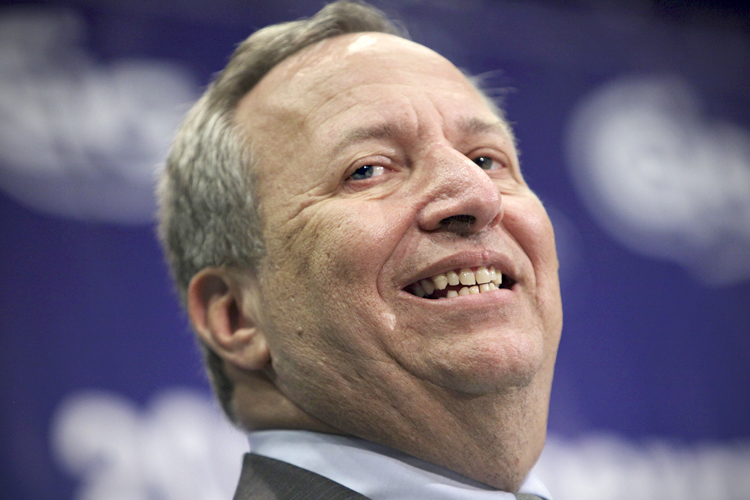(Lawrence Summers | Source: AP via Salon)
Last week, economic Voldemort Larry Summers stunned observers when he withdrew from consideration as chairman of the Federal Reserve. Much has been made of behind-the-scenes wrangling by progressive organizations that culminated in stands against Summers by four Democratic members of the Senate Banking Committee. The attention is deserved. This was a surprising rebuke of the White House, which had hinted that the nomination was a “done deal.”
|
Without a clear, publicly articulated agenda to which to hold policymakers, progressives will continue to play catch up, scrambling to slay the next incarnation of Larry Summers.
|
While this sign that a burgeoning progressive coalition has started to assert itself is a dramatic step forward from even months ago, when Wall Street lawyer Mary Jo White was appointed to the SEC without resistance, the still-inchoate aftermath also underscores that the progressives have yet to turn their “seat at the table” into a substantive part in the conversation.
A key element of the anti-Summers campaign was a letter circulated by Ohio Senator Sherrod Brown, signed by 20 of his colleagues, supporting Fed Vice Chair Janet Yellen as nominee. Most important was what the letter did not say. By ignoring Summers, the senators indicated their resistance to the president’s widely-known favorite. But now, with Summers out of the running, commentators on the left question how much improvement Yellen really represents. They are concerned that, while serving alongside Summers under President Clinton, Yellen vocally supported the Glass-Steagall repeal, and helped develop a “chained CPI” measure that would slowly undermine Social Security—neoliberal policies of the sort for which Summers was vilified.
Has Yellen learned from her mistakes? Recent comments suggest she supports targeting unemployment over inflation (a clear contrast with Summers, but already policy in the Bernanke Fed) and has a broad interest in issues of economic inequality. But widespread public uncertainty about her views make clear that progressive groups’ approach to the Fed focused solely on blocking Summers, rather than vetting candidates or specifying an agenda of their own. (Tellingly, no commentators—or lawmakers—have yet said that Yellen would be their first choice to run the Fed.)
While it’s possible that agenda-setting is happening behind the scenes, much can be gained from establishing a clear policy agenda, preemptively staking policymakers to principles to guide them through the exigencies of the position. Part of the reason ideologues like Summers continue to return from apparently mortal wounds is that opponents have yet to offer a consistent alternative.
So what would constitute a progressive agenda for a nominee to the Fed?
A foundational question is whether the nominee would use regulatory powers in the interests of people, even when those diverge from the interests of the financial elite. Perhaps the key litmus test is whether they are willing to finally break up the riskiest banks. Public opinion strongly favors reducing the size of so-called “Too Big to Fail” banks. Yet every one of them is larger now than it was five years ago. This inaction is not for lack of regulatory authority.
Dodd-Frank requires the Fed to ensure risky banks could be safely wound down via bankruptcy proceeding—an approach favored by New York Fed President William Dudley—and provides unprecedented authority to constrain their activity, or even force divestment of entire subsidiaries, if the institution can’t—the type of preemptive bank break-up progressives favor.
The sentiment among informed observers is that no large bank, including Citi or Bank of America, could reasonably go through bankruptcy as currently structured. All that’s missing is a willingness to use the authority given the Fed by law. One could imagine Massachusetts Sen. Elizabeth Warren asking Yellen the sort of question that has garnered her YouTube fame—“Are you willing to break up the big banks?”
Breaking up banks would instantly remake the economic landscape, but the Fed has other tools that could shape a less top-heavy economy. The Fed currently spends over $80 billion every month on purchases of mortgage bonds and Treasuries, and this round of “Quantitative Easing” (QE) still has no end in sight. Rather than propping up markets on the premise that gains will “trickle down,” why not use this largesse to directly stimulate the bottom and middle of the economy?
For instance, over the past year the Fed has accumulated nearly half a trillion dollars of mortgage assets. While cities like Richmond, California, fight tooth-and-nail to use eminent domain to seize and reset underwater mortgages, the Fed already has sizable influence over vulnerable sectors of the market—and could directly intervene by financing the purchase and writedown of at-risk mortgages, dramatically turning the tide on a foreclosure crisis affecting millions of homeowners.
Other key sectors are within the Fed’s reach. When announcing QE, the Fed made clear to not limit itself to mortgage assets, reserving authority to “undertake additional asset purchases”—possibly including student loans. The Fed has warned that student debt is an increasing headwind on the larger economy, causing millions to delay or forego entirely plans for home ownership, auto purchases, or even families. At $80 billion per month, the Fed could acquire the entire $1.2 trillion of outstanding student loans in 15 months, and refinance—or completely eliminate—these debts.
These are just a few of many crises in which the Fed could reasonably intervene.
The Fed’s broad market and regulatory powers give it sway over progressive adversaries as varied as usurious payday lenders, exploitative debit-card fees, and high-frequency trading. Importantly, the Fed nomination is just one of many economic battles to come.
But without a clear, publicly articulated agenda to which to hold policymakers, progressives will continue to play catch up, scrambling to slay the next incarnation of Larry Summers.
That’s no one’s definition of progress.
Aaron Bornstein is an independent writer living in New York City.







0 Comments